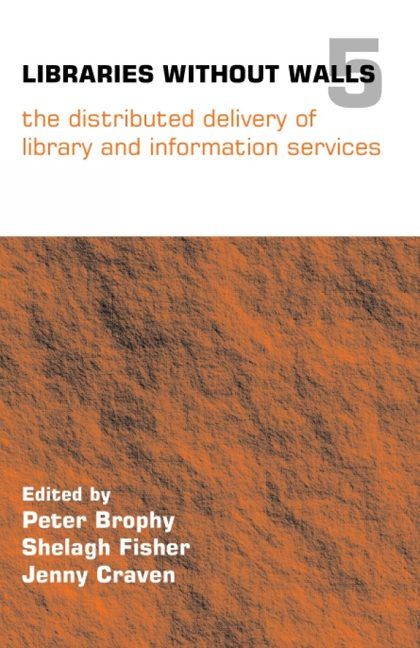Book contents
- Frontmatter
- Contents
- Contributors
- 1 Introduction
- 2 Keynote paper: beyond the mainstream of library services
- THEME 1 THE INTEGRATION OF LIBRARY SERVICES AND VIRTUAL LEARNING ENVIRONMENTS
- THEME 2 THE RELATIONSHIP BETWEEN USER NEEDS, INFORMATION SKILLS AND INFORMATION LITERACIES
- THEME 3 USABILITY AND ACCESSIBILITY OF DIGITAL LIBRARY SERVICES
- THEME 4 DESIGNING THE INFORMATION ENVIRONMENT: NATIONAL AND INSTITUTIONAL PERSPECTIVES
- 17 Supporting learning, teaching and research at Manchester Metropolitan University
- 18 Disintermediation via web services in Portuguese public libraries
- 19 Denmark's electronic research library: from national project to permanent activity
- 20 Research resources and the academic researcher
- THEME 5 THE CREATION OF DIGITAL RESOURCES BY USER COMMUNITIES
- Index
- Miscellaneous Endmatter
- Miscellaneous Endmatter
- misc-endmatter
- Miscellaneous Endmatter
20 - Research resources and the academic researcher
from THEME 4 - DESIGNING THE INFORMATION ENVIRONMENT: NATIONAL AND INSTITUTIONAL PERSPECTIVES
Published online by Cambridge University Press: 08 June 2018
- Frontmatter
- Contents
- Contributors
- 1 Introduction
- 2 Keynote paper: beyond the mainstream of library services
- THEME 1 THE INTEGRATION OF LIBRARY SERVICES AND VIRTUAL LEARNING ENVIRONMENTS
- THEME 2 THE RELATIONSHIP BETWEEN USER NEEDS, INFORMATION SKILLS AND INFORMATION LITERACIES
- THEME 3 USABILITY AND ACCESSIBILITY OF DIGITAL LIBRARY SERVICES
- THEME 4 DESIGNING THE INFORMATION ENVIRONMENT: NATIONAL AND INSTITUTIONAL PERSPECTIVES
- 17 Supporting learning, teaching and research at Manchester Metropolitan University
- 18 Disintermediation via web services in Portuguese public libraries
- 19 Denmark's electronic research library: from national project to permanent activity
- 20 Research resources and the academic researcher
- THEME 5 THE CREATION OF DIGITAL RESOURCES BY USER COMMUNITIES
- Index
- Miscellaneous Endmatter
- Miscellaneous Endmatter
- misc-endmatter
- Miscellaneous Endmatter
Summary
Introduction
The provision of high-quality research information delivered to researchers in a timely fashion is a prerequisite of internationally recognized research. But what information do researchers require? Has their use of library and information sources changed in recent years and do they envisage further changes in the future?
The Research Support Libraries Group (RSLG) was established in 2001 with a remit to make proposals for a national strategy to ensure that all UK researchers continue to have access to world class information sources. The final report was published in Spring 2003 (RSLG, 2003) with the recommendation to establish the Research Libraries Network to develop, prioritize and lead a UK-wide strategy for research information provision.
The report drew strongly on a national survey carried out by the Social Informatics Research Unit at the University of Brighton, Education for Change and the Research Partnership (Education for Change, Social Informatics Research Unit and Research Partnership, 2002). The aim of the study was to provide a picture of how researchers use libraries and other information sources in practice and how they predicted that this use would change over the next five years, especially as more material becomes available online (www.rslg.ac.uk/research). This paper presents key findings from the study, outlining the information needs and user patterns of the UK academic research community, and considers the implications for librarians seeking to provide services that meet the future needs of academic researchers.
Research methodology
The study was carried out between September 2001 and June 2002. The methodology included a literature review, a questionnaire survey of individual researchers and focus groups of researchers drawn from a range of institutions, disciplines and levels of seniority.
The evidence of the research survey, supported by the literature and focus group views, is the principal source for this paper. The survey questionnaire was designed to gather evidence relating to the following broad issues:
• the nature, range and volume of material researchers required in different disciplines
• the nature of access required and how they currently use the material in their research
• the implications for the research process of where materials are located and what achievable patterns of location and accessibility of information sources are optimal
• the extent to which researchers currently access research materials on line, and the perceived advantages and shortcomings of accessing materials in this way
- Type
- Chapter
- Information
- Libraries Without Walls 5The Distributed Delivery of Library and Information Services, pp. 204 - 216Publisher: FacetPrint publication year: 2004



